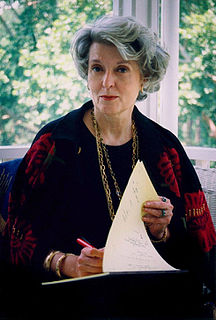A Quote by Erica Jong
language can't be appropriated by one person, one poet. The words belong to all of us.
Related Quotes
We believe we can also show that words do not have exactly the same psychic "weight" depending on whether they belong to the language of reverie or to the language of daylight life-to rested language or language under surveillance-to the language of natural poetry or to the language hammered out by authoritarian prosodies.
As a poet and writer, I deeply love and I deeply hate words. I love the infinite evidence and change and requirements and possibilities of language; every human use of words that is joyful, or honest or new, because experience is new... But as a Black poet and writer, I hate words that cancel my name and my history and the freedom of my future: I hate the words that condemn and refuse the language of my people in America.
Writing engenders in us certain attitudes toward language. It encourages us to take words for granted. Writing has enabled us to store vast quantities of words indefinitely. This is advantageous on the one hand but dangerous on the other. The result is that we have developed a kind of false security where language is concerned, and our sensitivity to language has deteriorated. And we have become in proportion insensitive to silence.
It has not been definitively proved that the language of words is the best possible language. And it seems that on the stage, which is above all a space to fill and a place where something happens, the language of words may have to give way before a language of signs whose objective aspect is the one that has the most immediate impact upon us.
Language both reflects and shapes society. Culture shapes language and then language shapes culture. Little wonder that the words we use to talk to each other, and about each other, are the most important words in our language: they tell us who I am, they tell us who you are, they tell us who 'they' are.
Every person in the world is by nature a slave to sin. The world, by nature, is held in sin's grip. What a shock to our complacency- that everything of us by nature belongs to sin. Our silences belong to sin, our omissions belong to sin, our talents belong to sin, our actions belong to sin. Every facet of our personalities belong to sin; it own us and dominates us. We are its servants.
You belong with me, Scarlett, haven't you figured that out? And the world is where we belong, all of it. We're not home-and-hearth people. We're the adventurers, the buccaneers, the blockade runners. Without challenge, we're only half alive. We can go anywhere, and as long as we're together, it will belong to us. But, my pet, we'll never belong to it. That's for other people, not for us.
When I was a young person I went to the university and I learned a rational language, to think with the left side of the brain. But in the right side of the brain you have intuition and imagination. Words are not the truth; they indicate the way to go, but you need to go alone, in silence. Symbols have a language that kills the words.







































